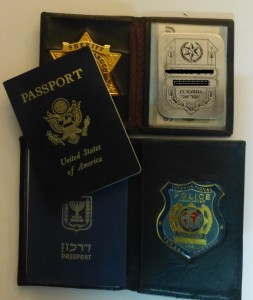
The program is designed for senior officials, police chiefs, sheriffs, and state & federal law enforcement officials all over the US to meet with elite units from the Jerusalem Police, Border Police & Shin Bet.
– ‘Israel is the best at dealing with terrorism, and we want to learn from your experience,’ says former FBI counter-terrorism head.
Citing Israel as the world leader in counter-terrorism, 15 senior American law enforcement officials from the Law Enforcement Exchange Program (LEEP) are spending 10 days in the country to observe multiple security agencies.
SENIOR US law enforcement officials in Jerusalem participating in LEEP, a counterterrorism exchange program. – Photo: LEEP
The program’s director, Steve Pomerantz, a retired FBI assistant director who led the organization’s counter-terrorism unit, said LEEP is part of the US’s Jewish Institute for National Security Affairs, also known as JINSA.
While JINSA, a security think tank that primarily works with military personnel, was created in 1973, Pomerantz said LEEP was initiated for law enforcement leaders throughout the US shortly after the 911 terrorist attacks in 2001.
“This is a program designed for senior management: police chiefs, sheriffs, and state and federal law enforcement officials all over the US,” said Pomerantz by phone in Jerusalem on Thursday.
“There are 15 different agencies represented, including the chiefs of the New York and Miami police, the head of the LA Country Sheriff’s Office, the DEA assistant administrator, and the department commander of the US Customs and Border Protection.”
Pomerantz said the men, who arrived on Sunday, will meet with elite units from the Jerusalem Police, Border Police and Shin Bet (Israel Security Agency), until November 24.
“The purpose is to see how the Israel National Police and other security agencies, including Shin Bet, prevent and respond to acts of terrorism,” he said of the annual exchange program.
“How they gather and disseminate intelligence and what their protocols and processes are in responding to terrorism.”
Noting the shifting forms of terrorism that Israel is subjected to – from bombs, to vehicles, to knives – Pomerantz said the country is indisputably the world’s leader in effectively combating terrorists.
“Now Israel is experiencing a different type of terrorism – knifings and lone wolf attacks – for which there is almost no way to detect who will do it,” he said.
“We’re learning a lot about how the police are responding to this latest change because Israel’s security agencies are always on the forefront on the fight against terrorists. Israel is the best at dealing with terrorism and we want to learn from your experience.”
Moreover, Pomerantz said that Israeli security officials are more than willing to share their hard-earned expertise.
“They roll out the red carpet for us,” he said appreciably. “We were considering postponing this year’s visit because of the current situation, but they urged us not to postpone.”
Over the course of 10 days, Pomerantz said the group will observe and be briefed on police activities in the capital, with an emphasis on the Old City, meet with Border Police, a Shin Bet official, tour the new police academy, and travel north.
“We have been briefed in detail about policing in the Old City, visited with Border Police and seen their training and operational capabilities, and will be briefed by a senior Shin Bet official,” he said.
“We’re also visiting police in Northern Israel to be briefed about smuggling and anti-terrorism operations there.”
Pomerantz said he cites two primary reasons for the trip when raising the funds necessary to cover its costs.
“I say, one: Because they’re the best – out of necessity and what they’ve been through, they’ve become the best,” he explained. “And two: The Israeli National Police operate in a democratic society very similar to police departments in the US.”
“I always say if you’re in a totalitarian system, counter-terrorism is a lot easier: everyone you suspect, you just lock them up,” Pomerantz continued. “Israel and the US don’t do that; we operate under the rule of law.”
With respect to the Israeli Police’s many international critics, who claim that officers violate human rights, Pomerantz said such sentiments are unfounded and made out of ignorance.
“It’s simply not true,” he said. “Anybody who says that either is not objective, or has never been here to see it and doesn’t know what they’re talking about.”
Meanwhile, after being afforded the uncommon opportunity to view Israel’s counter-terrorism operations firsthand, Pomerantz said LEEP participants leave with a deep appreciation and respect for the country and its people.
“Most participants have never been here, and learn about Israel and its people and come away with very strong and positive impressions of what they have seen,” he said.
View original The Jerusalem Post publication at:
http://www.jpost.com/Israel-News/Senior-US-law-enforcement-officials-visiting-to-study-Israeli-counterterrorism-ops-434709







 Israeli New Shekel Exchange Rate
Israeli New Shekel Exchange Rate